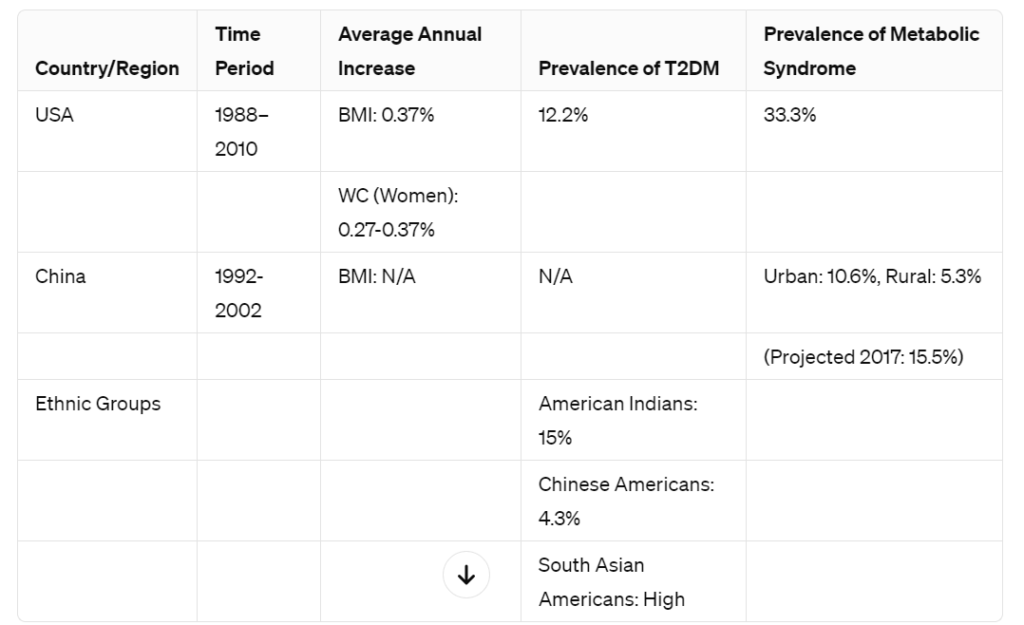In the hustle and bustle of modern life, amidst the gleaming skyscrapers and bustling city streets, a silent epidemic lurks. Millions of people experience it subtly, and it has an impact on their longevity, vigor, and health. The metabolic syndrome, a collection of linked metabolic irregularities that opens the door to chronic conditions like diabetes, heart disease, and stroke, is this silent invader. As we navigate through our daily routines, dining in hotels, attending conferences, or exploring new destinations, the metabolic syndrome silently accompanies us, wreaking havoc on our bodies.
Recognising the incidence and effects of metabolic syndrome is the first step towards understanding it. In the seminal journal article “The Global Epidemic of the Metabolic Syndrome,” Mohammad G. Saklayen and his associates brought attention to this urgent matter, imploring legislators and medical professionals to act decisively. Come with me as we investigate the extent of this global disease and its impact on hotel guests across the globe.
Key Takeaways
- A collection of metabolic disorders known as the metabolic syndrome greatly raises the chance of developing chronic diseases.
- Stress, sedentary behavior, and poor diet are examples of lifestyle factors that are crucial in the development of metabolic syndrome.
- Hotel environments, often characterised by limited healthy food options and disrupted routines, can exacerbate the risk of metabolic syndrome among travellers.
- The management of metabolic syndrome and the avoidance of its related consequences depend heavily on early detection and intervention.
Exploring the Global Impact
The metabolic syndrome is not restricted by geography, culture, or socioeconomic status. Its influence is felt in both tranquil vacation communities and busy metropolises. Saklayen et al. (Year) emphasise the global nature of this epidemic, citing alarming statistics that underscore its magnitude. Whether you find yourself in the heart of New York City or amidst the tranquil landscapes of Bali, metabolic syndrome may lurk around the corner, waiting to ensnare the unwary traveller.
Understanding the Components
To comprehend the metabolic syndrome, one must delve into its intricate components. Elevated blood pressure, dyslipidemia, insulin resistance, and abdominal obesity form the cornerstone of this multifaceted condition. Each element, while significant on its own, collectively contributes to an increased risk of developing life-threatening diseases. Saklayen and his team meticulously dissect these components, highlighting their interplay and emphasising the importance of comprehensive management strategies.

Impact of Lifestyle Factors
Maintaining a healthy lifestyle in the fast-paced world of hotel living can prove challenging. Long hours, irregular mealtimes, and limited exercise opportunities create a breeding ground for metabolic dysfunction. Saklayen’s research underscores the detrimental impact of these lifestyle factors, painting a stark picture of the uphill battle hotel dwellers face. From lavish buffet spreads to tempting room service menus, the temptations are aplenty, making it too easy to succumb to unhealthy habits.
The Role of Hotel Weight Loss
Amidst the sea of challenges, a beacon of hope emerges – Hotel Weight Loss. With its innovative approach to wellness and tailored weight loss programs, Hotel Weight Loss stands poised to revolutionise the hospitality industry. Providing guests with nutritious meal options, personalised fitness plans, and ongoing support empowers them to take charge of their health and combat metabolic syndrome head-on. Incorporating elements of the keto diet, intermittent fasting, and mindful eating, Hotel Weight Loss offers a holistic approach to weight management that transcends mere calorie counting.
Facts and Figures
Find below a table showing the prevelance of metabolic syndrome and T2DM in different regions of the world.

Conclusion
As we bid farewell to the confines of this article, let us remember the urgency of the matter at hand. The global epidemic of metabolic syndrome continues to loom large, casting a shadow over our collective well-being. Yet, amidst the gloom, a glimmer of hope exists – a path forward illuminated by the guiding light of knowledge and innovation. Let us seize this opportunity to embark on a journey towards health and vitality, with Hotel Weight Loss serving as our steadfast companion. Together, we can overcome the challenges posed by metabolic syndrome and pave the way for a healthier, happier future.
FAQs
What is the metabolic syndrome?
How prevalent is the metabolic syndrome globally?
What role do lifestyle factors play in the development of the metabolic syndrome?
What dietary strategies are employed by Hotel Weight Loss?
Is Hotel Weight Loss suitable for all individuals?
How can I get started with Hotel Weight Loss?
What sets Hotel Weight Loss apart from other wellness programs?
Can Hotel Weight Loss accommodate dietary restrictions and preferences?
What long-term support does Hotel Weight Loss offer?
Embark on your journey to optimal health today. Contact Hotel Weight Loss to discover how their innovative keto diet ideas and personalized weight loss programs can help you conquer the metabolic syndrome and achieve your wellness goals. Take the first step towards a brighter, healthier future – your body will thank you.
Also, see Conquer Any City: 5 Personalized Fitness Plans for Travelers (Who Hate Holding Back!)
References
Saklayen MG. The Global Epidemic of the Metabolic Syndrome. Curr Hypertens Rep. 2018 Feb 26;20(2):12. doi: 10.1007/s11906-018-0812-z. PMID: 29480368; PMCID: PMC5866840.
National Center for Health Statistics, Division of Health Interview Statistics. Crude and age-adjusted percentage of civilian, noninstitutionalized adults with diagnosed diabetes, United States, 1980–2010. National Center for Chronic Disease Prevention and Health Promotion, Ed. Atlanta, GA, Centers for Disease Control and Prevention, Division of Diabetes Translation, 2012. Retrieved from: https://www.cdc.gov/diabetes/data/statistics-report/index.html
Palaniappan LP, Wong EC, Shin JJ, et al. Asian Americans have greater prevalence of metabolic syndrome despite lower body mass index. In J Obe. 2017;35:393–400. doi: 10.1038/ijo.2010.152. [PMC free article] [PubMed] [CrossRef] [Google Scholar]
Wang Y, Mi J, Shan X, et al. Is China facing an obesity epidemic and the consequences? The trends in obesity and chronic disease in China. Int J Obesity. 2007;31:177–188. doi: 10.1038/sj.ijo.0803354. [PubMed] [CrossRef] [Google Scholar]
2015 Obesity collaborators GBD. Health effects of overweight and obesity in 195 countries over 25 years. N Engl J Med. 2017; [PMC free article] [PubMed]




